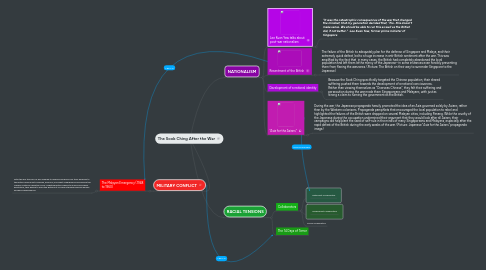
1. MILITARY CONFLICT
1.1. The Malayan Emergency (1948 to 1960)
1.1.1. After the war the MPAJA was ordered to disband and hand over their weapons to the British. While most complied, around 4,000 went underground and formed the Malayan National Liberation Army. Targeting British-owned tin mines and rubber plantations, they hoped to drive the British out of Malaya through guerilla warfare and gain independence.
2. NATIONALISM
2.1. Lee Kuan Yew talks about post-war nationalism
2.1.1. "It was the catastrophic consequences of the war that changed the mindset, that my generation decided that, "No...this doesn't make sense. We should be able to run this as well as the British did, if not better." -Lee Kuan Yew, former prime minister of Singapore
2.2. Resentment of the British
2.2.1. The failure of the British to adequately plan for the defense of Singapore and Malaya, and their extremely quick defeat, led to a huge increase in anti-British sentiment after the war. This was amplified by the fact that, in many cases, the British had completely abandoned the local population and left them at the mercy of the Japanese--in some instances even forcibly preventing them from fleeing the warzones. (Picture: The British on their way to surrender Singapore to the Japanese)
2.3. Development of a national identity
2.3.1. Because the Sook Ching specifically targeted the Chinese population, their shared suffering pushed them towards the development of a national conciousness. Rather than viewing themselves as "Overseas Chinese", they felt their suffering and persecution during the war made them Singaporeans and Malayans, with just as strong a claim to running the government as the British.
2.4. "Asia for the Asians"
2.4.1. During the war, the Japanese propaganda heavily promoted the idea of an Asia governed solely by Asians, rather than by the Western colonizers. Propaganda pamphlets that encouraged the local population to rebel and highlighted the failures of the British were dropped on several Malayan cities, including Penang. While the cruelty of the Japanese during the occupation undermined their argument that they would look after all Asians, their campaigns did help plant the seed of self-rule in the minds of many Singaporeans and Malayans, especially after the rapid defeat of the British during the early weeks of the war. (Picture: Japanese "Asia for the Asians" propaganda image)
3. RACIAL TENSIONS
3.1. Collaborators
3.1.1. Nationalist Collaborators
3.1.2. Government Collaborators
3.1.3. Police collaborators

